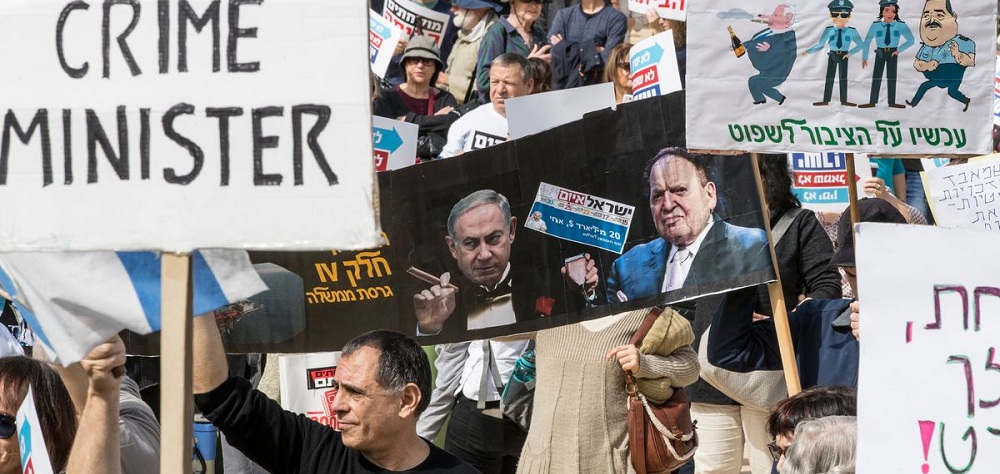Alwaght- As the Israeli regime is living its most unstable days amid challenges for forming a new cabinet, the Israeli attorney general on Thursday in a statement announced that he is indicting Benjamin Netanyahu. The ruling, which is in its last stages, will deeply influence the political equations and also the power of the ruling Likud party, very likely putting Netanyahu’s political fate on a shaky ground.
Netanyahu case
Israeli Attorney General Avishay Mandelblit in his Thursday statement said that the prime minister is being indicted for bribery and corruption. Netanyahu has been accused in three key cases of using the public trust and political power in the recent years. In what is known as “case 1000” he was accused of receiving gifts from prominent people including an Australian billionaire. In “case 2000”, he is accused of collusion with Yidioth Ahronoth and Arnon Mozis newspapers. The most important one is “case 4000.” In this case he is charged with receiving loans from the incomes of Israeli Bizik company so that he could buy media coverage among the home media. The indictment suggests that in the first two cases he is accused of malversation and in the third one of bribery.
This stage of the court was initiated in the early October and the results of the investigation were planned to be published in late November. They are being issued after a 21-day delay.
The reactions after the indictment
After the indictment, Netanyahu took paradoxical stances, indicating that he is being exposed to heavy political and mental pressures these days. In the early hours, he deeply blasted the statement saying that “a man should be blind so that he cannot see what is happening in the police station and the court.” He called the move a “coup” and added that the investigations were meant to oust a right government. He initially pressed that he is not stepping down from power. He then shifted his stances saying that when the case is closed in the court, he will accept the verdict and will respect the law.
The erratic remarks by Netanyahu are seen by many analysts as driven by a fear of being finally sentenced. That is why he is targeting the police and investigators on the one hand and showing restraint in the face of the supreme court on the other hand. His wife was charged with abusing the public interests and was ordered to pay €14,000 in compensation a couple of months ago.
Benny Gantz, the head of Blue and White alliance, who had said that he was not interested to form a government with Netanyahu due to his corruption, said that “this is a sad day for Israel.” The leader of Labor Party Amir Peerets said that the anti-Netanyahu charges set up the key obstacle ahead of forming a new government. “In a democracy, we cannot accept a prime minister under indictment,” he was quoted as saying.
Netanyahu’s opponents are now in a stronger position than before. Ayman Awdah, an Arab Israeli politician following the attorney general’s statement said that Netanyahu’s hatred and racism will not be omitted by prison. “It is our duty to work towards a peaceful society; a democracy of equality that serves all of the citizens,” he said.
What would be Netanyahu’s fate?
If Netanyahu had formed a government before this indictment, he could have seen a relatively better position now. To his desperation, the court has issued its charges against him while not him nor Gantzs, two key figures set to form government, have not managed to form a new cabinet and a new early election is now a likely option. So, Netanyahu is facing the indictment in a weakest political position. He employed a team of 12 lawyers to defend him in the court. According to the Israeli laws, the PM or president can send his lawyers or representatives in a hearing session or temporarily resign, for 100 days, and attend the sessions.
Although Netanyahu’s lawyers are struggling to clear him from the charges, his opponents are leading unceasing efforts to get from the supreme court his removal. If he is convicted, he will have to resign to allow for his sentence implementation. According to the Israeli rules, bribery charges take 10 years and embezzlement charges take three years in prison.
As Netanyahu represents a hurdle ahead of a new government formation, his party tries to get rid of him for two major reasons: First, he is Likud’s leader and his conviction will deal a major blow to the party’s image and credibility. The Israeli Channel 12 on Friday reported that senior Likud figures have concluded that the era of Netanyahu has ended. The channel further said that the party is debating his ditching behind the scenes but is yet to reach a replacement for him. Second, Likud cannot invest on a failed choice to continue its political life.
Netanyahu largely bipolarized the Israeli politics and finally caused a united front of opponents to rise against him. So, a new gamble of Likud on Netanyahu not only will not help solve problems blocking the cabinet formation but also will encourage the rival parties not only seize the PM post but also under a powerful alliance take the largest possible number of ministries for themselves in a new government. The likeliest speculation is that Likud will not sacrifice its interests to Netanyahu’s position.



























